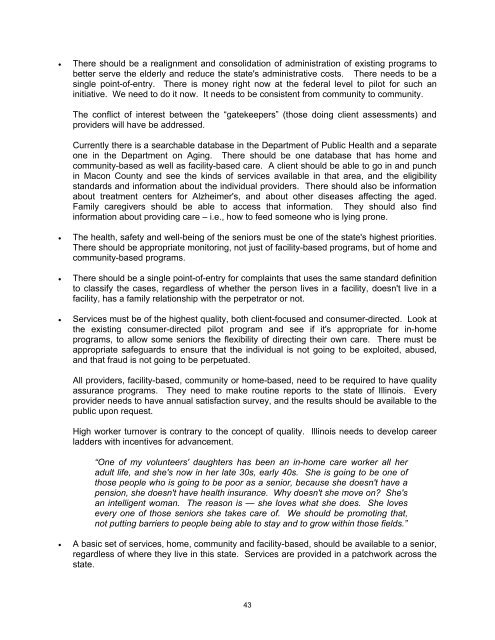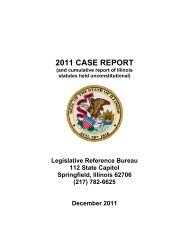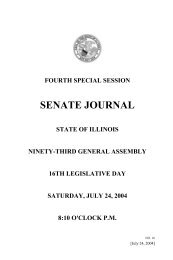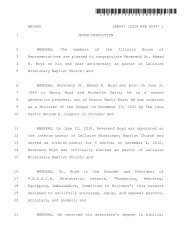Long-Term Care - Illinois General Assembly
Long-Term Care - Illinois General Assembly
Long-Term Care - Illinois General Assembly
You also want an ePaper? Increase the reach of your titles
YUMPU automatically turns print PDFs into web optimized ePapers that Google loves.
• There should be a realignment and consolidation of administration of existing programs to<br />
better serve the elderly and reduce the state's administrative costs. There needs to be a<br />
single point-of-entry. There is money right now at the federal level to pilot for such an<br />
initiative. We need to do it now. It needs to be consistent from community to community.<br />
The conflict of interest between the “gatekeepers” (those doing client assessments) and<br />
providers will have be addressed.<br />
Currently there is a searchable database in the Department of Public Health and a separate<br />
one in the Department on Aging. There should be one database that has home and<br />
community-based as well as facility-based care. A client should be able to go in and punch<br />
in Macon County and see the kinds of services available in that area, and the eligibility<br />
standards and information about the individual providers. There should also be information<br />
about treatment centers for Alzheimer's, and about other diseases affecting the aged.<br />
Family caregivers should be able to access that information. They should also find<br />
information about providing care – i.e., how to feed someone who is lying prone.<br />
• The health, safety and well-being of the seniors must be one of the state's highest priorities.<br />
There should be appropriate monitoring, not just of facility-based programs, but of home and<br />
community-based programs.<br />
• There should be a single point-of-entry for complaints that uses the same standard definition<br />
to classify the cases, regardless of whether the person lives in a facility, doesn't live in a<br />
facility, has a family relationship with the perpetrator or not.<br />
• Services must be of the highest quality, both client-focused and consumer-directed. Look at<br />
the existing consumer-directed pilot program and see if it's appropriate for in-home<br />
programs, to allow some seniors the flexibility of directing their own care. There must be<br />
appropriate safeguards to ensure that the individual is not going to be exploited, abused,<br />
and that fraud is not going to be perpetuated.<br />
All providers, facility-based, community or home-based, need to be required to have quality<br />
assurance programs. They need to make routine reports to the state of <strong>Illinois</strong>. Every<br />
provider needs to have annual satisfaction survey, and the results should be available to the<br />
public upon request.<br />
High worker turnover is contrary to the concept of quality. <strong>Illinois</strong> needs to develop career<br />
ladders with incentives for advancement.<br />
“One of my volunteers' daughters has been an in-home care worker all her<br />
adult life, and she's now in her late 30s, early 40s. She is going to be one of<br />
those people who is going to be poor as a senior, because she doesn't have a<br />
pension, she doesn't have health insurance. Why doesn't she move on? She's<br />
an intelligent woman. The reason is — she loves what she does. She loves<br />
every one of those seniors she takes care of. We should be promoting that,<br />
not putting barriers to people being able to stay and to grow within those fields.”<br />
• A basic set of services, home, community and facility-based, should be available to a senior,<br />
regardless of where they live in this state. Services are provided in a patchwork across the<br />
state.<br />
43
















